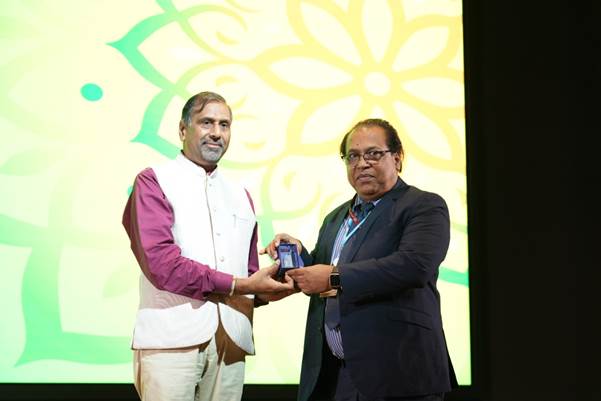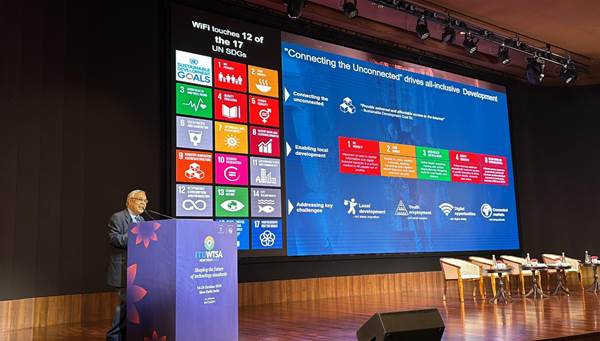ITU Kaleidoscope-2024 Concludes with Focus on Connectivity and Inclusivity
The three-day ITU Kaleidoscope-2024 being held at the ITU-WTSA 2024 centered on bridging the digital divide, and exploring how emerging technologies can connect underserved population concluded yesterday. The day additionally featured engaging discussions on the role of youth in standardization, with students and young professionals sharing their perspectives on how to engage the next generation in global standardization efforts.
Mr. Rohit Sharma, Member (Services), Digital Communications Commission, Department of Telecommunications, Government of India, chaired the session on “How to respond quantum computing threats and its standardization trend: Quantum Key Distribution and Post Quantum Cryptography.” The keynote session by Prof. Heung Youl Youm, Chairman of ITU-T Study Group 17, highlighted the challenges in cybersecurity posed by quantum computing, emphasizing the need for standardization in post-quantum cryptography.

Mr. Rohit Sharma, Member (Services), Department of Telecommunications in his opening remarks, stated, “ As we navigate the challenges of the digital age, the emergence of quantum computing presents both immense opportunities and significant risks. While this technology holds the potential to revolutionize fields like cryptography and secure communications, it also poses new challenges that must be addressed at a global scale. The standardization of Quantum Key Distribution (QKD) and the development of post-quantum cryptography are essential steps in preparing for this technological shift. Moreover, collaboration with international community will further future-proof our communications systems.”
The first panel of Day 3 titled, “Connecting the Remaining 3 Billion,’ focused on the critical issue of closing the global digital divide. Moderated by Prof. Mohamed-Slim Alouini from King Abdullah University of Science and Technology (KAUST), Saudi Arabia, This session included Ellie Joo, Marketing and Policy Lead – Taara at X and Satya N. Gupta, Secretary General of the ITU-APT Foundation of India. Satya N. Gupta presented PM-Wani (Prime Minister Wi-Fi Access Network Interface), a successful initiative in India that leverages public Wi-Fi to provide affordable internet access to rural communities. His talk highlighted how such scalable models can be adapted globally to foster digital inclusion and bridge the digital divide.
The second panel titled, “Youth and Standardisation,” brought attention to the growing role of youth in telecommunications standards development. Mr. Sharad Arora, international expert in e-learning, security, telecommunications, and IoT gave a presentation on The Role of Standards and Standardization Activities, whereas, Mr. Thomas Basikolo Programme Officer in the Telecommunication Standardization Policy Department of the ITU Telecommunication Standardization Bureau gave a presentation on ITU Standardisation work and its international standards. Additionally, a panel session was scheduled which was moderated by Ms. Kumud Jindal, ADG-Digital Intelligence, Department of Telecommunications. The panelists included Sonali Garg, Manager-Standards & Research Group, HFCL; Vinit Ranjan, ADG-Wireless Finance; Diksha Dhiman, ADET- NTIPRIT; and Akshat Shrivastava, Student B.Tech Final Year, IIT-Delhi. The session emphasized on the need to enhance youth participation in shaping the future of global standards for emerging technologies such as 5G, AI, and quantum communication. The session concluded with a call to action for increased youth representation in international organizations to ensure that the next generation actively contributes to building an inclusive and secure digital future
Bilel Jamoussi, Deputy to the Director and Chief of Telecommunication Standardization Policy Department in his opening remarks for the session, stated, “Youth participation in the standardization process not only drives innovation but also opens the door to significant opportunities, including the creation of standard essential patents. This can lead to both recognition and financial benefits. By engaging in the standardization process, you not only contribute to global solutions but also position yourselves to lead successful ventures in the future.”
The conference concluded with a closing ceremony led by Mario Maniewicz, Director of Radiocommunication Bureau (BR), ITU, and Deb Kumar Chakrabarti, Director General, National Communication Academy, Department of Telecommunications & General Chairman of Kaleidoscope 2024. Awards of CHF 6000 were presented for the best three research papers. Young authors certificates were given to 18 young authors of the selected papers. Among the exceptional submissions, three projects were awarded top honours for their outstanding contributions.
Deb Kumar Chakrabarti, Director General, National Communication Academy, Ghaziabad, Department of Telecommunications & General Chairman of Kaleidoscope 2024, in his closing remarks, stated, “This event provided a unique platform for thought leaders to share ideas on the future of telecom, and I extend my congratulations to the Kaleidoscope award winners and all participants. The diverse presentations showcased the critical role of technologies like 6G, IoT, AI, and quantum computing in shaping the global digital landscape and addressing key challenges. The insights gained here will guide future strategies, enhance telecom networks, and empower millions, contributing to a more inclusive and sustainable world.”
The 1st prize went to the Artificial Intelligence Driven Tilt Sensor-Based Smart Drinking Device for Stroke Survivors, developed by Preeta Sharan and Anup M Upadhyaya from The Oxford College of Engineering, India, along with R Vasanthan from The Oxford College of Physiotherapy, India. The 2nd prize was awarded to the Elderly Wellness Companion With Voice and Video-Based Health Anomaly Detection, created by Dhananjay Kumar, Mehal Sakthi M S, and Sowbarnigaa K S from Anna University, India, alongside Ved P. Kafle from the National Institute of Information and Communications Technology, Japan. The 3rd prize was given to Alpha-Bit: An Android App for Enhancing Pattern Recognition Using CNN and Sequential Deep Learning, developed by Gobi Ramasamy, Arokia Paul Rajan, and Priyadharshini Rengasamy from Christ University, India, along with Antoine Bagula from the University of the Western Cape, South Africa.
The event emphasized the importance of continued collaboration to achieve global digital transformation, particularly through inclusivity and access.

